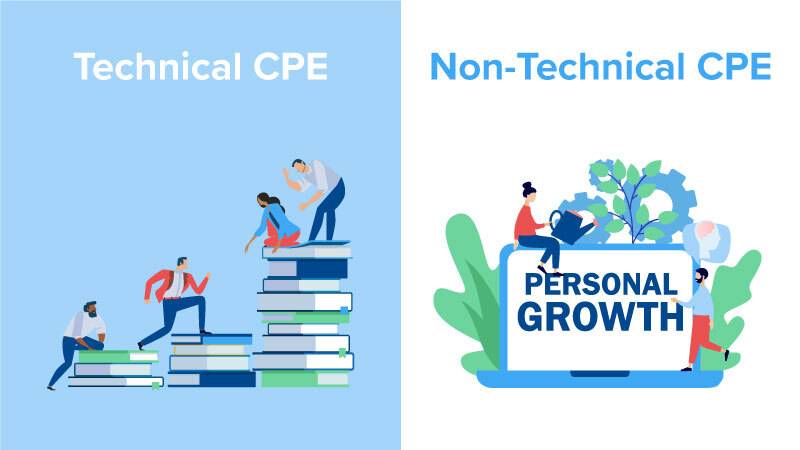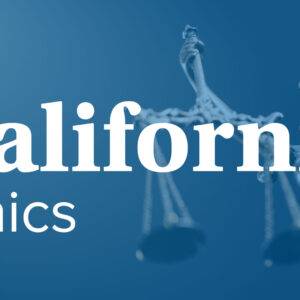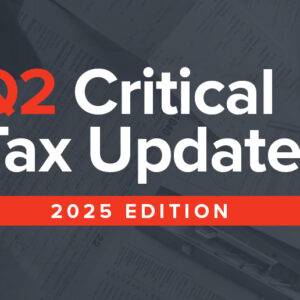WESTERN CPE BLOG
Providing the latest tax news, information, and updates for tax and finance professionals
Technical vs Non-Technical CPE: What’s the Difference?
If you’re reading this article, you’re probably familiar with the terms CPE and CE. If by chance you are not, we’ll start there. Once we’ve hit the basics, we’ll explain the two broad categories of CPE: technical CPE and non-technical CPE.
What is the difference between CPE and CE credits?
Continuing professional education (CPE) and continuing education (CE) are interchangeable terms that refer to the educational requirements professionals acquire to maintain, improve, and enhance their skills and knowledge. Though the concept is the same, the terminology differs in:
Industry usage
CPE is more commonly used in heavily-regulated industries, such as accounting, law, engineering, and healthcare, to enhance industry-specialized knowledge
CE is more commonly used in other professions or industries, such as teaching, social work, and the trades
Professional organizations
CPE is often required by professional organizations that regulate licensed professionals, like the National Association of State Boards of Accountancy (NASBA)
CE is more commonly required by employers or industry associations
Hours, credits and requirements
CPE requirements are typically measured in hours and generally mandatory
CE requirements can be measured in various ways, such as credits, units, or clock hours, and they are most often optional with little to no requirements for completion
Educational content
CPE is typically focused on technical or professional content related to the specific industry to maintain or improve needed skills
CE can cover a broader range of topics and general interests that may not be related to a particular industry or profession for reasons such as personal development
Certification or license renewal
CPE is often required for professionals to renew their certification or license before the license expiration date
CE is often required for employment or membership in an industry association
To sum these differences up in one sentence, while both ongoing education and training for professionals CPE leans industry-specific and mandatory while CE leans more broad-focused and optional. Now let’s move on to breaking down CPE into technical CPE and non-technical CPE.

Technical CPE
Technical CPE, or technical fields of study, is education focused on enhancing technical skills and knowledge related to a specific profession or industry. With the continues changes in many important industries, professionals must stay up-to-date with the latest changes and developments.
What does technical CPE incorporate?
The content of technical CPE will vary depending on the industry, but it covers need-to-know topics including laws, regulations, and practices. These topics include accounting, auditing, and finance. This type of CPE is usually required by professional and regulatory organizations to maintain certification or license. For an accountant, obtaining technical CPE credits could be attending a seminar or conference, completing a webcast or self-study course, and in more entertaining cases, listening to a podcast.
Technical CPE for CPAs
Technical subject matter can be delivered in various formats, and the length and format may vary depending on the industry requirements. To ensure technical CPE courses meet professional development standards, they are often offered by accredited providers or institutions approved by professional and regulatory organizations, such as NASBA, an organization serving certified public accountants (CPAs).
NASBA is the National Association of State Boards of Accountancy. Since 1908, this professional organization serves as a forum for the 55 state boards of accountancy in the United States, the District of Columbia, Puerto Rico, Guam, the U.S. Virgin Islands and the Northern Mariana Islands. NASBA continues its mission by “enhancing the effectiveness and advancing the common interests of the Boards of Accountancy by creating innovative avenues for accounting regulators, educators and practitioners alike to address emerging issues relevant to the viability of the accounting profession.”
NASBA provides a variety of services to its members, including:
Administering the CPA Examination: NASBA works with the American Institute of Certified Public Accountants (AICPA) to administer the Uniform CPA Examination. For an individual to become a licensed CPA, they must receive their license from Board of Accountancy in their state after passing the CPA exam.
Overseeing CPE Standards: NASBA is responsible for developing and updating the standards for CPE for licensed CPAs. These standards ensure CPAs are staying up-to-date with the latest developments and changes in the accounting world. NASBA promotes consistency and uniformity of enforcement practices.
Providing Education and Research: NASBA conducts research on issues related to the accounting profession while developing educational resources and training tools for its Board members. In an ever-changing industry, NASBA focuses on keeping focus on relevant education and high quality content. The organization also emphasizes the importance of ethical behavior across all state boards of accountancy.
Offering Regulatory Support: NASBA provides constant support and resources to their board members to fulfill their unique regulatory responsibilities. They uphold the need for effective communication with the State Boards of Accountancy to present timely information and monitor changes to rules and regulations.
Technical CPE Courses
When calculating the amount of technical CPE credits you need, each State Board of Accountancy has its own requirements. See your state requirements, HERE.
Below you’ll find examples and links to some of the Technical CPE Courses available at Western CPE:
Non-Technical CPE
Non-technical CPE, or non-technical fields of study, is education focus on enhancing non-technical skills and knowledge. This type of CPE can be relevant to any profession or industry because the main objective is to help professionals develop critical skills necessary for their career growth and success.
What does non-technical CPE incorporate?
The content of non-technical CPE is designed to increase overall professional skills such as personal development, communication, marketing and management skills. This type of CPE is also requirement for maintaining a CPA license in most states, in addition to technical CPE credits. For an accountant, obtaining non-technical CPE credits can also be obtained by attending a seminar or conference, or completing webcast and self-study courses.
Non-technical CPE for CPAs
Just like technical CPE courses, non-technical CPE courses can be delivered in various formats, and the length and format may vary depending on the industry requirements. CPAs should be encouraged to choose non-technical courses relevant to their career goals and personal interests.
Keep in mind, these courses may be of personal choice but they still must meet the requirements of their State Board of Accountancy.
Non-technical CPE Courses
To calculate the amount of non-technical CPE credits need for your state, check out our state requirements page.
Below you’ll find examples and links to some of the Non-technical CPE Courses courses available at Western CPE:
Ethics education: Technical or Non-technical CPE?
So, is ethics CPE technical or non-technical? Great question! Ethics CPE can fall under either category, depending on the content and focus of the course.
Technical Ethics Course: Focused on the technical aspects of accounting ethics, such as updates to the Code of Professional Conduct or specific regulations related the CPA’s field. Professional ethics content can also vary per state.
Non-technical Ethics Course: Focused on building skills and personal development related to ethical decision-making, ethical leadership, or social responsibility.
Why The Two Categories Matter
Though technical fields and non-technical fields differ in content and learning objectives, together they create a valuable way for CPAs to stay current with industry trends, topics and laws while strengthening their professional skills. With the required education in technical subject matter and non-technical subject matter, CPAs and other professionals can remain competitive in their field.
-
Self-Study
Ethics for California
$116.00 – $136.00 Select options This product has multiple variants. The options may be chosen on the product page -
Webcast
Q2 Critical Tax Updates
$98.00Original price was: $98.00.$49.00Current price is: $49.00. Add to cart -
Self-Study
Individual Income Tax Credits & Due Diligence Requirements
$145.00 – $175.00 Select options This product has multiple variants. The options may be chosen on the product page -
Self-Study
Become an Expert on Lookup Functions
$58.00 – $78.00 Select options This product has multiple variants. The options may be chosen on the product page -
Self-Study
Accountant Ethics for Delaware
$116.00 – $136.00 Select options This product has multiple variants. The options may be chosen on the product page -
Self-Study
Error-Proofing Excel Spreadsheets
$145.00 – $175.00 Select options This product has multiple variants. The options may be chosen on the product page







